

The Department of Electrical Engineering, at SKN Sinhgad College of Engineering Established in the year 2010. The department offers a B. Tech degree in Electrical Engineering (UG Course) with an Honors Degree in Electrical Vehicle.
The Department is known for its state-of-the-art infrastructure, qualified and experienced faculty having expertise in diverse fields, and excellence in Industry Institute Interaction. The department has an excellent infrastructural facility which consists of various labs like Basic Electrical Engineering, Control Systems, Power Systems, and Electronic Devices & Control, Electrical Machines Laboratory etc.
The class rooms are equipped with ICT tools and Wi-Fi facilities are available in the department. The department has excellent computing facility with advanced software such as AutoCAD, MATLAB, SCILAB etc. Besides high-quality teaching at UG levels, the Department is actively involved in providing high-quality technical advisory support through various sponsored projects and consultancy to various organizations.
The department has signed MOUs with reputed organizations Like Tech Mantra, PANTECH E- Learning and Spartan Technologies for providing students training, internship, industrial visits, faculty development programs and placements. The department has Electrical Engineering Students Association (EESA) provides a platform for students to show their talents and also encourages them to enhance Self-esteem, team spirit and ethics through organizing various events like field visits, technical competitions, arrangement of workshop, guest lectures, etc. Mini-project work undertaken by students has improved their problem-solving skills. In order to interact with the parents, a parent meet is organized regularly in which the progress of the students and departmental activities are discussed. The department has started a mentoring scheme called as Teacher Guardian (TG) in which every student meets their mentor faculty (TG teacher) every week to discuss issues related to academic, co-curricular, and other career opportunities.
We encourage our students for participating in the National level events like Spectrum, WEENGS, etc. Students are participating in project exhibition at University and State Level “Avishkar”. Department received grants from AICTE, PAHSUS as mentioned below; Seed Money for Research from Punyashlok Ahilyadevi Holkar Solapur University, Solapur for the project entitled “Electric Vehicle Charging Station” for the year 2023-24 received a grant of Rs. 85000/-.
Department have strong alumni bond which helps the students to provide training, expert lecture in emerging fields which provides placement opportunities. The department has revealed a great deal of industry goodwill owing to its continuous interaction with industry for mutual sharing of the academic-industry experiences. Several of the graduates who have passed out as Electrical engineer are occupying responsible positions in various Engineering Industries, Government & Semi Government Organizations and pursuing higher studies in the premier educational institutes in and outside India.
To be a leading technical education and research centre in electrical engineering, empowering students through innovation, ethics and social responsibility.
Engineering Graduate will be able to:
| Sr.No | Semester | Class | Name of Company | No.of Students | Date | Academic Year |
|---|---|---|---|---|---|---|
| 1 | II | T.Y | Railway Station Pandharpur | 65 | 27/04/2024 | 2023-24 |
| 2 | II | S.Y | Srujan Foods Pvt.Ltd.Chincholikati Solapur | 63 | 20/04/2024 | 2023-24 |
| 3 | I | S.Y | 11KV/400V Secondary Distribution Sub-station and Diesel Generating Station of SKN Sinhgad College of Engineering Korti. | 73 | 18/12/2023 | 2023-24 |
| 4 | I | L.Y | RYB Power Electricals Pvt Ltd.Sonalwadi,Sangola | 61 | 1/11/2023 | 2023-24 |
| 5 | I | T.Y | 400/220kv MSETCL Substation Lamboti, Solapur | 51 | 13/10/2023 | 2023-24 |
| 6 | II | S.Y | 220 KV Substation Nerle (MSETCL) | 45 | 1/6/2023 | 2022-23 |
| SR.No. | Academic Year | Number of Companies | Number of Students |
|---|---|---|---|
| 1. | 2023-24 | 35 | 94 |
| 2. | 2022-23 | 23 | 37 |
| 3. | 2021-22 | 15 | 68 |
| 4. | 2020-21 | 18 | 68 |
| 5. | 2019-20 | 14 | 69 |
| 6. | 2018-19 | 18 | 69 |
| 7. | 2017-18 | 25 | 75 |
| Sr. No | Name of the Student | Batch /Passing Year | Name of the Compay | Duration of internship | Paid /Unpaid |
|---|---|---|---|---|---|
| 1 | Mule Abhinav Praful | 2024-25 | Codsoft, InfoaidTech, Bharatintern | 09/01/204 to 20/01/2024 | Unpaid |
| 2 | Misal Vishwasanket Sanjay | 2024-25 | Domastic data entry operator | 9-9-2023 to 30-9-2023 | Unpaid |
| 3 | Pawar Mayur Ankush | 2024-25 | TCS | 09-09-2023 to 23/10/23 | Unpaid |
| 4 | Jawanjal Sakshi Dattatraya | 2024-25 | Intershala | 1-08-2023 to 31-08-2023 | Unpaid |
| 5 | Utpat Trupti Ramchandra | 2024-25 | Leadsoft IT Solutions | 7th August to 19th August 2023 | Unpaid |
| 6 | YADAV SHARAD NARAYAN | 2023-24 | Internshala. , PHN Technology pune , NITI Aayog | 21-08-2023. 06-04-2023 to 06-06-2023. 21-08-2023. | Unpaid |
| 7 | RAUT YOGESH SHANKAR | 2024-25 | Forage | 1-8-23 To 26-8-23 | Unpaid |
| 8 | Patil Vaibhavi Sagar | 2024-25 | Optimistic | 3-8-2023 to 21-8-2023 | Unpaid |
| 9 | Babar Pranjal Yuvaraj | 2023-24 | 1) Conducted by Electrical Engineer Australia 2) Kodacy | 1) 28-05-23 to 01-08-23 2) 15 days | Unpaid |
| 10 | Ranshur Yashraj Anand | 2024-25 | InfoTech | 15-09-2023 To 31-10-2023 | Unpaid |
| 11 | Bhosale Saurabh Shrikant | 2024-25 | Website Maker | October November | Unpaid |
| 12 | Patil shubham suresh | 2024-25 | Intershala | 1.11.2023 | Unpaid |
| 13 | Karape Ashitosh Arjun | 2024-25 | Msme | 04-09-23 to 06-10-23 | Unpaid |
| 14 | Kothare Anushka Uttam | 2024-25 | LeadSoft IT Solutions | 07-08-2023 to 19-082023 | Unpaid |
| 15 | Thengal samadhan kisan | 2024-25 | Online | 07-11-23 | Unpaid |
| 16 | Dhat Saianand Suresh | 2023-24 | Emertxe Technology Company | Start date: 17th Aug 2023 & End Date : 18th Oct 2023 | Unpaid |
| 17 | Naykude NagendraKumar Shivaji | 2023-24 | Octanet private limited | 1/10/2023 to 29/11/2023 | Unpaid |
| 18 | Shinde Akshay Santosh | 2023-24 | Oasis Infobyte | 10-10-23 to 10-11-23 | Unpaid |
| 19 | Lokhande Pallavi Hanumant | 2023-24 | DANA India Private ltd. | 15-10-2023 to 6-11-2023 | Unpaid |
| 20 | Pandhe Shraddha Kiran | 2025-26 | YBI foundation | 0 | Unpaid |
| 21 | Pandhe Shraddha Kiran | 2025-26 | YBI Foundation | 1/12/2023-16/12/2023 | Unpaid |
| 22 | Tambile Ruturaj sanjay | 2023-24 | Oasis infobyte | 15.10.2023to15.112.2023 | Unpaid |
| 23 | Deshmukh Sohel Tayyab | 2023-24 | PLC and SCADA | 2-2-2024 to 2-5-2024 | Unpaid |
| 24 | Devkule Aditya Appa | 2023-24 | Shri Mahi Transformer and Electrical work | 01-02-24 to 30-04-24 | Unpaid |
| 25 | Dhat Saianand Suresh | 2023-24 | Subros Pvt. Ltd. Pune. | 12-02-24 to 12-05-24 | Paid |
| 26 | Dhumal Suyash Sudhakar | 2023-24 | Solar Equipment Design & Making | 02-02-2024 to 02-05-2024 | Unpaid |
| 27 | Doke pravin mohan | 2023-24 | Spartan technology | 2-2-2024to 2-5-2024 | Unpaid |
| 28 | Dudhal Sagar Shivaji | 2023-24 | Solar Equipment Design and Making | 02-02-2024 to 02-05-2024 | Unpaid |
| 29 | Gaikwad Ganesh Savata | 2023-24 | PlC and SCADA Automation | 02-02-2024 to 02-05-2024 | Unpaid |
| 30 | Ganjale Akash Dnyaneshwar | 2023-24 | Plc and SCADA | From 02-02-2024 to 02-05-2024 | Unpaid |
| 31 | Ganje Krushna Namdev | 2023-24 | The World Of Automation | 02-02-24 to 02-05-24 | Unpaid |
| 32 | Hadmode Rachana Dilip | 2023-24 | 9190 | 7-03-24 to 30-4-24 | Unpaid |
| 33 | Jadhav Aditya Dattatray | 2023-24 | Solar Equipment Design and Making | 02-02-2024 to 02-05-2024 | Unpaid |
| 34 | Jagtap Nikhil Nagesh | 2023-24 | The world of automation | 2-2-2024 to 2-5-2024 | Unpaid |
| 35 | Akanksha Siddheshwar Kambire | 2023-24 | Trainee | 01 Feb 2024 to 03 April 2024 | Unpaid |
| 36 | Karanavar Anil Jagannath | 2023-24 | PLC and scada | 02-02-2024 to 02-05-2024 | Unpaid |
| 37 | Khade Mahesh Nagnath | 2023-24 | Solar Equipment Design and Making | 25th Jan 2024 to 30th Apr 2024 | Paid |
| 38 | Kharade Sainath Tatyaso | 2023-24 | Solar Equipment design and Making | 25 Jan 2024 to 30 Apr 2024 | Paid |
| 39 | Khare Tejas Baliram | 2023-24 | Tejas Baliram Khare | 2nd Feb 2024 to 2nd May 2024 | Unpaid |
| 40 | Lokare manojkumar balasaheb | 2023-24 | PLC and Scada | 2 Feb to 5 May | Unpaid |
| 41 | Lokare Shubham Chandrakant | 2023-24 | PLC And Scada | 02-02-2024 to 02-05-2024 | Unpaid |
| 42 | Magar Onkar Suresh | 2023-24 | The world of automation | 03/01/2024 to 07/04/2024 | Unpaid |
| 43 | Mali Atish Arun | 2023-24 | Supra | 3/2/24 To 3/5/2024 | Unpaid |
| 44 | Mardhekar Nikita Namdev | 2023-24 | O/E/N INDIA LIMITED | 13-2-2024 to 30-4-2024 | Paid |
| 45 | Nagane Akshay Sunil | 2023-24 | Industrial Automation | 02/02/2024 To 02/05/2024 | Unpaid |
| 46 | Naykude Nagendrakumar Shivaji | 2023-24 | Subros Private Limited Pune | 12/02/2025 to 12/05/2024 | Paid |
| 47 | Pathan Arabaj Anjumkhan | 2023-24 | Plc and scada | 02-02-2024 | Unpaid |
| 48 | Pawar Balaji Gajanan | 2023-24 | Research and Development | 01/01/2024 to 01/04/2024 | Paid |
| 49 | Sakhare Mayuri Madhukar | 2023-24 | Mane Motors e-VEHICLE | 05-02-24 to 05-04-24 | Unpaid |
| 50 | Salunkhe Aniket Ravindra | 2023-24 | The World of Automation | 02-02-2024 to 02-05-2024 | Unpaid |
| 51 | Shelake daji madhukar | 2023-24 | OrionTech Solution | 12-2-23 to 27-4-23 | Unpaid |
| 52 | Akshay Santosh Shinde | 2023-24 | SAITECH ENGINEERS | 01-02-24 to 30-04-24 | Unpaid |
| 53 | Shinde Yash Navnath | 2023-24 | SAITECH ENGINEERS | 01-02-2024 to 30-04-2023 | Unpaid |
| 54 | Shingare Pravin Navnath | 2023-24 | Supra Industry | 03/02/2024-03/05/2024 | paid |
| 55 | Shitole Suyash Balaji | 2023-24 | Solar Equipment Design And Making | 2 Feb to 2 May 2024 | Unpaid |
| 56 | Takale shreya kalyan | 2023-24 | Nextgen solar park | 01-02-2024 to 30-04-2024 | Unpaid |
| 57 | Tambile Ruturaj Sanjay | 2023-24 | Solar equipment and design making | 1 nov to 30apr | Paid |
| 58 | Thengal Vijay Sarjerao | 2023-24 | Automation trainee Engineer. | 03.01.2024 to 07.04.2024 | Unpaid |
| 59 | Thorat vaishnavi balasaheb | 2023-24 | Trainee | 1/02/2024 to 3/42024 | Unpaid |
| 60 | Vyavahare Vijay Digambaar | 2023-24 | Vijay Vyavahare | 02.02.2024-02.05.2024 | Unpaid |
| 61 | Waghmare Ganesh santaji | 2023-24 | Ganesh | 22-01-2024 to 21-04-2024 | Unpaid |
| 62 | Waghmare Ganesh santaji | 2023-24 | Gana | 22-01-2024 to 21-04-2024 | Unpaid |
| 63 | Yadav Sharad Narayan | 2023-24 | 1) Savitri Automation and Controls Private Limited. (2) The World Of Automation | 05-02-24 To 05-05-24 | 1) Paid. 2) Unpaid |
| 64 | Yadav Sharad Narayan | 2023-24 | 2 | (1) 02-02-24 To 02-05-24. (2). 12-02-24 To 04-05-24. | Paid |
| 65 | Babar Pranjal Yuvaraj | 2023-24 | Data Analyst Intern | 01-02-2024 to 30-04-2024 | Unpaid |
| 66 | Babar Pranjal Yuvaraj | 2023-24 | Data Analyst Intern | 01-02-2024 to 30-04-2024 | Unpaid |
| 67 | Bagal Nikita Shantinath | 2023-24 | Nextgen solar park | 01-02-2024 to 30-04-2024 | Unpaid |
| 68 | Bhosale Nandini Abhijit | 2023-24 | Service engineer trainee | 1/3/2024 to 1/6/2024 | Paid |
| 69 | Randave Dinesh Santosh | 2023-24 | Automation | 2-2-2024 to 2-5-2024 | Unpaid |
| 70 | Patil Kajal Guruling | 2023-24 | Nextgen Solar Park | 1-2-2024 to 30-4-2024 | Unpaid |
| 71 | Lokhande Pallavi Hanumant | 2023-24 | In Solar Park Material and equipment testing and monitoring | 1-02-2024 to 30-04-2024 | Unpaid |
| 72 | Asabe Gauri Prabhakar | 2023-24 | Nextgen solar park | 01-02-2024 to 30-04-2024 | Unpaid |
| 73 | Ghogare Swapnali Ramahari | 2023-24 | O/E/N India limited | 13-02-2024 to 30-04-2024 | Paid |
| 74 | Dubal Arpita Pramod | 2023-24 | Copeland India Private Limited | 15-02-2024 to 3-05-2024 | Unpaid |
| 75 | Bhanvase Rutvik Arun | 2023-24 | Project Engineer at Solar | 5/02/2024 to 5/05/2024 | Paid |
| 76 | Gude Sumit Shrirang | 2023-24 | The world of automation | 02/02/20024 to 02/05/2024 | Unpaid |
| 77 | Karande shridevi Sambhaji | 2023-24 | Nextgen solar park | 1/2/24to30/4/24 | Unpaid |
| 78 | Yash Manmath Swami | 2023-24 | E-VEHICLE | 05-02-2024 to 05-04-2024 | Unpaid |
| 79 | Navale Sanket Vilas | 2023-24 | Design and Development Of Electric Vehicle | 05-02-2024 to 05-04-2024 | unpaid |
| 80 | Shinde Amar Shashikant | 2023-24 | Automation | 2-2-2024 to 2-5-2024 | Unpaid |
| 81 | Howal Saurabh Rajendra | 2023-24 | Design and development of electric vehicle | 05th February 2024 to 05th April 2024 | Unpaid |
| 82 | Dubal Arpita Pramod | 2023-24 | Copeland India Private Limited | 15-02-2024 to 03-05-2024 | Unpaid |
| 83 | Pawar Yuvraj pralhad | 2023-24 | Automation | 2-2-2024 to2-5-2024 | Unpaid |
| 84 | Aishwarya Dattatrya Dhale | 2023-24 | O/E/N India Limited | 13-2-2024 to 30-4-2024 | paid |
| 85 | Kale Rohit yuvraj | 2023-24 | The world of Automation | 2/2/2024 to2/5/2024 | Unpaid |
| 86 | Aniket Ravindra Salunkhe | 2023-24 | Automation | 02-02-2024 to 02-05-2024 | Unpaid |
| 87 | Karande shridevi sambhaji | 2023-24 | Nextgen cleantech pvt ldts | 1/2/24 to 30/4/24 | Unpaid |
| 88 | Tone Dhanashri Anand | 2023-24 | Testing of solar | 1-2-24 to 30-4-24 | Unpaid |
| 89 | Shaikh Mujamil Mukhtar | 2023-24 | Solar equipment design and making | 2 Feb to 2 April 2024 | Unpaid |
| 90 | Burande Rushikesh Ravsaheb | 2023-24 | Mane Moters E vehicle Pandharpur | 5/2/2024 to 5/4/2024 | Unpaid |
| 91 | Deshmukh Rohit Prafulla | 2023-24 | Spartan technologies | 25 Jan 2024 to 30 April 2024 | paid |
| 92 | Kale mahesh Hanumant | 2023-24 | The world of automation | 2/2/2024 to 2/5/2024 | Unpaid |
| 93 | Bandgar Dhanashri Malhari | 2023-24 | Spartan Technologies | 2-2-24 to 2-5-24 | Unpaid |
| 94 | Chhakuli Sitaram Khandekar | 2023-24 | Spartan technologies | 02 /02/2024 to 02/05/2024 | Unpaid |
| Sr. No. | Name of Faculty | Designation | Qualification | Experience In Yrs. | E-mail-ID |
|---|---|---|---|---|---|
| 1 | Dr. Kondooru Shivashanker | (HOD ELE), Associate Professor | M. Tech (EPS), Ph. D (Power Systems) | 10 | kondooru.shivashanker@sknscoe.ac.in |
| 2 | Mr. Vinodkumar Pandurang More | Assistant Professor | M.E. Electrical (Power Electronics & Drives) | 13 | vinodkumar.more@sknscoe.ac.in |
| 3 | Mrs. Chandane Anjali Ashank | Assistant Professor | M.Tech. (Control System) | 17 | anjali.chandane@sknscoe.ac.in |
| 4 | Mr. Korake Dattatraya Manohar | Assistant Professor | M.E. (Electronics) | 15 | dattatraya.korake@sknscoe.ac.in |
| 5 | Mr. Masal Arjun Ramchandra | Assistant Professor | M.E. (EPS) | 13 | arjun.masal@sknscoe.ac.in |
| 6 | Mr. Pradip Bibhishan Vyavahare | Assistant Professor | M.E. (Electrical) | 12 | pradip.vyavahare@sknscoe.ac.in |
| 7 | Mr. Nagnath Vyankati Khandekar | Assistant Professor | M.E. (EPS) | 9 | nagnath.khandekar@sknscoe.ac.in |
| 8 | Mr. Kishor Pratap Jadhav | Assistant Professor | M.E. (Electrical) | 9 | kishor.jadhav@sknscoe.ac.in |
| 9 | Mrs. God Swapna Popat | Assistant Professor | M.E. (Electrical) | 8 | Swapna.god@sknscoe.ac.in |
| 10 | Mr. Amol Nivrutti Godase | Assistant Professor | M. Tech. (IPS) | 7 | amol.godase@sknscoe.ac.in |
| 11 | Mrs. Sonali Dattatraya Ghodake | Assistant Professor | M.E. (EPS) | 4 | sonali.ghodake@sknscoe.ac.in |

The lab use to perform Electrical Machine related practicals. We having DC Machines, transformers, AC Induction Motors, Synchronous Motors and Alternators. SE electrical students and TE Electrical students will perform these experiments.

Power electronics lab is use to perform following experiments SCR , DIAC ,TRIAC ,MOSFET,IGBT characteristics, Verification of HALF & FULL BRIDGE Rectifier

Industrial DRIVES Lab Basically use to perform industrial drives related experiments. It consists of DC DRIVE control circuitry, AC drive control circuitry.

The objective of this laboratory is to familiarize students with the important basic concepts to stand sturdily in rapidly evolving world of modern technology. We have well equipped Basic Electrical Engg
This Lab is equipped with various measuring equipments to measure the electrical & non-electrical quantities like pressure, temperature, load etc.

This Lab is equipped with various control equipments and associated control system softwares etc.

The laboratory is well equipped with the simulated models of transmission lines and electrical machines to represent the power system network

The laboratory is well equipped with various licensed technical softwares like Labview, Matlab and also application softwares and System softwares
The Electrical Engineering Students Association (EESA) was established in the academic year 2013. The main role of the association is to learn and know beyond the curriculum. For this, we have planned numerous activities as part of our association. This include Industrial Visits, Industrial Trainings, Group Discussions, and Seminars by eminent personalities from the various industries/fields, debates & quiz, preparation for campus interviews, to motivate students to participate in various technical and cultural events.
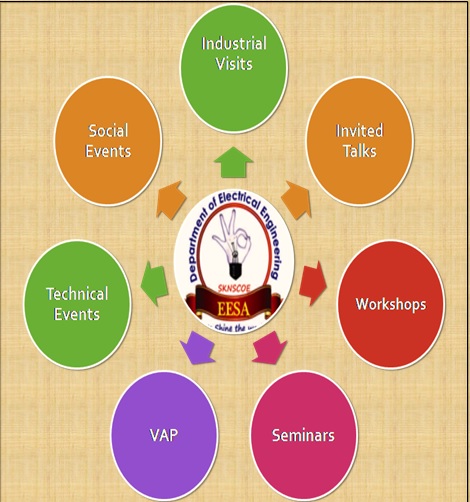
| Sr.NO | Designation | Class of Student | Name |
|---|---|---|---|
| 1 | President | B. Tech | Tejas Kulkarni |
| 2 | Vice President | TY. BTech. | Yash Pawar Saraswati Lengare |
| 3 | Secretory | TY. BTech. | Shraddha Pandhe |
| 4 | Event Organizer | T.Y. B.Tech | Anish Ghanate Dinesh Karande |
| 5 | Treasurer | TY. B.Tech | Akash chaugule |
| 6 | Jr. Treasurer | SY. B.Tech | Sankalp Shinde |
| 7 | Visit in-charge | SY B.Tech | Sayali Bagal Archana Jadhav |
| 8 | Ladies Representative | T.Y. B.Tech | Anishka Raut |
| 9 | News Editor | SY. BTech | Rohit Jadhav |
| 10 | Jr. News Editor | SY. BTech | Anagha Kulkarni |
| 11 | Joint Secretory | T.Y & SY. B.Tech | Bhakti Kadam Nikita Mali Snehal Kambale Bhagyashree Loni Dakshata Kokate |
| Sr.NO | Academic Year | Activity |
|---|---|---|
| 1 | 2023-24 | One Day Hands on Testing & motor rewinding |
| 2 | 2022-23 | Workshop on Mi Software |
| 3 | 2022-23 | Energetic 2K23 |
| 4 | 2022-23 | One Day Hands on Training in trouble shooting of home appliances |
| 2 | 2021-22 | Electrotech |
| 3 | 2021-22 | Teachers Day Celebration |
| 4 | 2021-22 | Innovative Idea Poster Contest |
| 5 | 2020-21 | A state level event online Quiz on C and C++ |
| 6 | 2020-21 | A state level on Resume Writing Competition" |
| Sr.No. | Name of the Faculty | Particulars of Award/Achievement/Recognition |
|---|---|---|
1 |
Dr. Kondooru Shivashanker |
|
2 |
Mr. A. A. Chandane |
|
3 |
Mr. V. P. More. |
|
4 |
Mr. D. M. Korake. |
|
5 |
Mr. N. V. Khandekar |
|
6 |
Mr. P. B. Vyavhare |
|
7 |
Mr. A.R.Masal |
|
8 |
Mr. S. D. Ghodake |
|
9 |
Mr. K. P. Jadhav |
|
10 |
Mrs. S. P. God |
|
| Sr. No | Name Of Students | Name Of Event | Name Of Organisation | AY | Position |
|---|---|---|---|---|---|
| 1 | Abhinav Mule | Project competition | AGTI’S,Dr. DaulatroaAher College of Engg. karad | 2023-24 | Winner |
| 2 | Aditya Devkule | GATE Exam 2024 | Indian Institute of science , Bengaluru | 2023-24 | Qualified |
| 3 | Tejas Kulkarni | Solar e-Cycle championship | SKNSCOE, Pandharpur | 2023-24 | Runner |
| 4 | Abhinav Mule | Solar e-Cycle championship | SKNSCOE, Pandharpur | 2023-24 | Runner |
| 5 | Saurabh Bhosale | Solar e-Cycle championship | SKNSCOE, Pandharpur | 2023-24 | Runner |
| 6 | Purushottam Asabe | Solar e-Cycle championship | SKNSCOE, Pandharpur | 2023-24 | Runner |
| 7 | Gunda Gujale | Solar e-Cycle championship | SKNSCOE, Pandharpur | 2023-24 | Runner |
| 8 | Vikrant Sarade | Solar e-Cycle championship | SKNSCOE, Pandharpur | 2023-24 | Runner |
| 9 | Avishkar Bhosale | Solar e-Cycle championship | SKNSCOE, Pandharpur | 2023-24 | Runner |
| 10 | Rushikesh Tanpure | Solar e-Cycle championship | SKNSCOE, Pandharpur | 2023-24 | Runner |
| 11 | Daulat Mali | Solar e-Cycle championship | SKNSCOE, Pandharpur | 2023-24 | Runner |
| 12 | Omkar Tanpure | Solar e-Cycle championship | SKNSCOE, Pandharpur | 2023-24 | Runner |
| 13 | Sagar Chavan | Solar e-Cycle championship | SKNSCOE, Pandharpur | 2023-24 | Runner |
| 14 | Rohit Deshmukh | Poster Presentation | FTC,COE Sangola | 2023-24 | Winner |
| 15 | Balaji Pawar | Paper Presentation | FTC,COE Sangola | 2023-24 | Winner |
| 16 | Nagendrakumar Nykude | Poster Presentation | FTC,COE Sangola | 2023-24 | Winner |
| 17 | Sainand Dhat | Paper Presentation | FTC,COE Sangola | 2023-24 | Winner |
| 18 | Pranjal Babar | Paper Presentation | FTC,COE Sangola | 2023-24 | Winner |
| 1 | Saniya Shaikh | Solo Singing | Carnival 2K24 | 2023-24 | Winner |
| 2 | Aiswarya Jadhav | Kabaddi | SKNSCOE, Pandharpur | 2023-24 | Runner |
| 3 | Nagendrakumar Nykude | Best Dressed Boy | SKNSCOE, Pandharpur Carnival 2K24 | 2023-24 | Winner |
| 4 | Yashraj Ranshur | Photography | Carnival 2K24 | 2023-24 | Winner |
| 5 | Jankar Pratima | Street play | Carnival 2K24 | 2023-24 | Runner |
| 6 | Bankar Vaishnavi | Cricket | SKNSCOE, Pandharpur | 2023-24 | Runner |
| 7 | Sagar Dudhal | Box Cricket | ROTARACT Club | 2023-24 | Winner |
| 8 | Krushna Ganje | Box Cricket | ROTARACT Club | 2023-24 | Winner |
| 9 | Pravin Shingare | Mechatronics | FTC,COE Sangola | 2023-24 | Winner |
| 1 | Manojkumar Lokare | Project Competion | Avishkar 2022 University Level Research Festival | 2022-23 | Runner |
| 2 | Yuvraj Pawar | Project Competion | Avishkar 2022 University Level Research Festival | 2022-23 | Runner |
| 3 | Rohan Nalawade | Ideathom | Sknscoe, Pandharpur National Level | 2022-23 | Runner |
| 4 | Ajinkya Pawar | Ideathom | Sknscoe, Pandharpur National Level | 2022-23 | Runner |
| 5 | Asabe Gauri | SPECTRUM -2K22Electrical Puzzle | Sknscoe, Pandharpur National Level | 2022-23 | Winner |
| 1 | Mulani Ayaan | Basketball | Sknscoe, Pandharpur National Level | 2022-23 | Winner |
| 2 | Arati Naiknaware | Solo Dance | Sknscoe, Pandharpur National Level | 2022-23 | Winner |
| 3 | Aishwarya Jadhav | Cricket | Sknscoe, Pandharpur National Level | 2022-23 | Winner |
| 4 | Sakshi Jawanjal | Best Resume Compitition | Sknscoe, Pandharpur National Level | 2022-23 | Runner |
| 5 | Bankar Atul | 2K22 Start up Idea in Electrical Engg. | Sknscoe, Pandharpur National Level | 2022-23 | Winner |
| 6 | Pawar Balaji | 2K22 Start up Idea in Electrical Engg. | Sknscoe, Pandharpur National Level | 2022-23 | Runner |
| 1 | Hunde Diksha | 2K22 Start up Idea in Electrical Engg. | Sknscoe, Pandharpur college Level | 2021-22 | Winner |
| 2 | Bankar Atul | 2K22 Start up Idea in Electrical Engg. | Sknscoe, Pandharpur National Level | 2021-22 | Winner |
| 3 | Pawar Balaji | 2K22 Start up Idea in Electrical Engg. | Sknscoe, Pandharpur National Level | 2021-22 | Runner |
| 1 | Khanewale Kamina | WEENGS-2K20 | SKNSCOE, Pandharpur State Level | 2020-21 | Winner |
| 2 | Khurd Prajakta | WEENGS-2K20 | SKNSCOE, Pandharpur State Level | 2020-21 | Winner |
| 3 | Nagtilak Swati | WEENGS-2K20 | SKNSCOE, Pandharpur State Level | 2020-21 | Winner |
| 4 | Manedeshmukh Mayuri | WEENGS-2K20 | SKNSCOE, Pandharpur State Level | 2020-21 | Winner |
| 5 | Rout Suraj | WEENGS-2K20 | SKNSCOE, Pandharpur State Level | 2020-21 | Runner |
| 6 | Waghmare Santosh | WEENGS-2K20 | SKNSCOE, Pandharpur State Level | 2020-21 | Runner |
| 7 | Sutar Vishal | WEENGS-2K20 | SKNSCOE, Pandharpur State Level | 2020-21 | Runner |
| 8 | Kadam Ravi | WEENGS-2K20 | SKNSCOE, Pandharpur State Level | 2020-21 | Runner |
| 9 | Gawali Sonali | WEENGS-2K20 | SKNSCOE, Pandharpur State Level | 2020-21 | Runner |
| 10 | Lawand Pooja | WEENGS-2K20 | SKNSCOE, Pandharpur State Level | 2020-21 | Runner |
| 11 | Ohal Pragati | WEENGS-2K20 | SKNSCOE, Pandharpur State Level | 2020-21 | Runner |
| 12 | Pore Shrutika | WEENGS-2K20 | SKNSCOE, Pandharpur State Level | 2020-21 | Runner |
| 1 | Shinde Sangram | Electrotech BGMI | SKNSCOE, Pandharpur National Level | 2020-21 | Winner |
| 2 | Kshirsagar Omkar | Electrotech Treasure Hunt | SKNSCOE, Pandharpur National Level | 2020-21 | Runner |
| 3 | Bhanvase Komal | Electrotech Treasure Hunt | SKNSCOE, Pandharpur National Level | 2020-21 | Runner |
| 4 | Shete Vedika | Electrotech Treasure Hunt | SKNSCOE, Pandharpur National Level | 2020-21 | Runner |
| 5 | Kokare Sainath | Electrotech Treasure Hunt | SKNSCOE, Pandharpur National Level | 2020-21 | Winner |
| 6 | Salunkhe Onkar | Electrotech Treasure Hunt | SKNSCOE, Pandharpur National Level | 2020-21 | Winner |
| 7 | Jagtap Aniket | Electrotech Treasure Hunt | SKNSCOE, Pandharpur National Level | 2020-21 | Winner |
| 8 | Survase Onkar | Electrotech Treasure Hunt | SKNSCOE, Pandharpur National Level | 2020-21 | Winner |
| 9 | Bhosale Krishna | Electrotech BGMI | SKNSCOE, Pandharpur National Level | 2020-21 | Runner |
| 10 | Tarapurkar Ruturaj | Electrotech BGMI | SKNSCOE, Pandharpur National Level | 2020-21 | Runner |
| 11 | Virkar Prasad | Electrotech BGMI | SKNSCOE, Pandharpur National Level | 2020-21 | Runner |
| 12 | Suryawanshi Onkar | Electrotech BGMI | SKNSCOE, Pandharpur National Level | 2020-21 | Runner |
| 13 | Bhojane Samarth | Electrotech BGMI | SKNSCOE, Pandharpur National Level | 2020-21 | Winner |
| 14 | Kashid Prasad | Electrotech BGMI | SKNSCOE, Pandharpur National Level | 2020-21 | Winner |
| 15 | Bansode Abhi | Electrotech BGMI | SKNSCOE, Pandharpur National Level | 2020-21 | Winner |
| 16 | Shinde Sangram | Electrotech BGMI | SKNSCOE, Pandharpur National Level | 2020-21 | Winner |
| 17 | Dubal Arpita | Srujan rang 2020-21 | University Level | 2020-21 | Winner |
| 18 | Honmane Saurabh | Srujan rang 2020-21 | University Level | 2020-21 | Runner |
| 19 | Lokhande Pallavi | Srujan rang 2020-21 | University Level | 2020-21 | Runner |
| 20 | Salavi Mariya | Srujan rang 2020-21 | University Level | 2020-21 | Winner |
| 21 | Sagar Ishika | Srujan rang 2020-21 | University Level | 2020-21 | Winner |
| 22 | Bhadule Shweta | Srujan rang 2020-21 | University Level | 2020-21 | Winner |
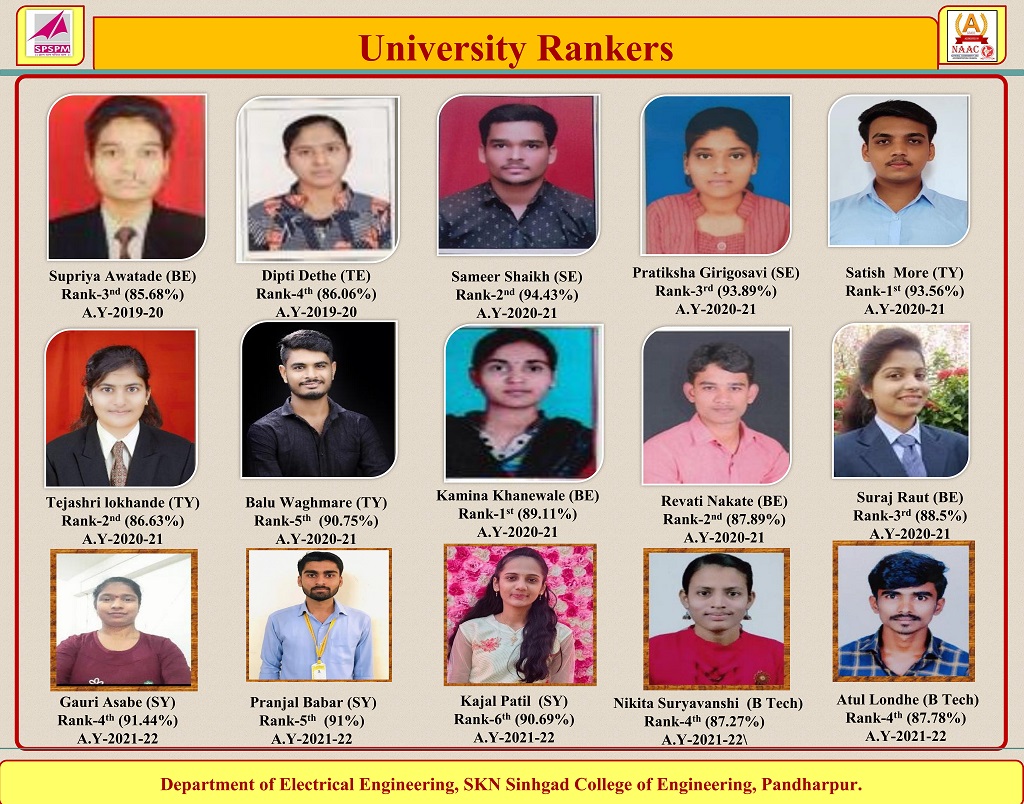
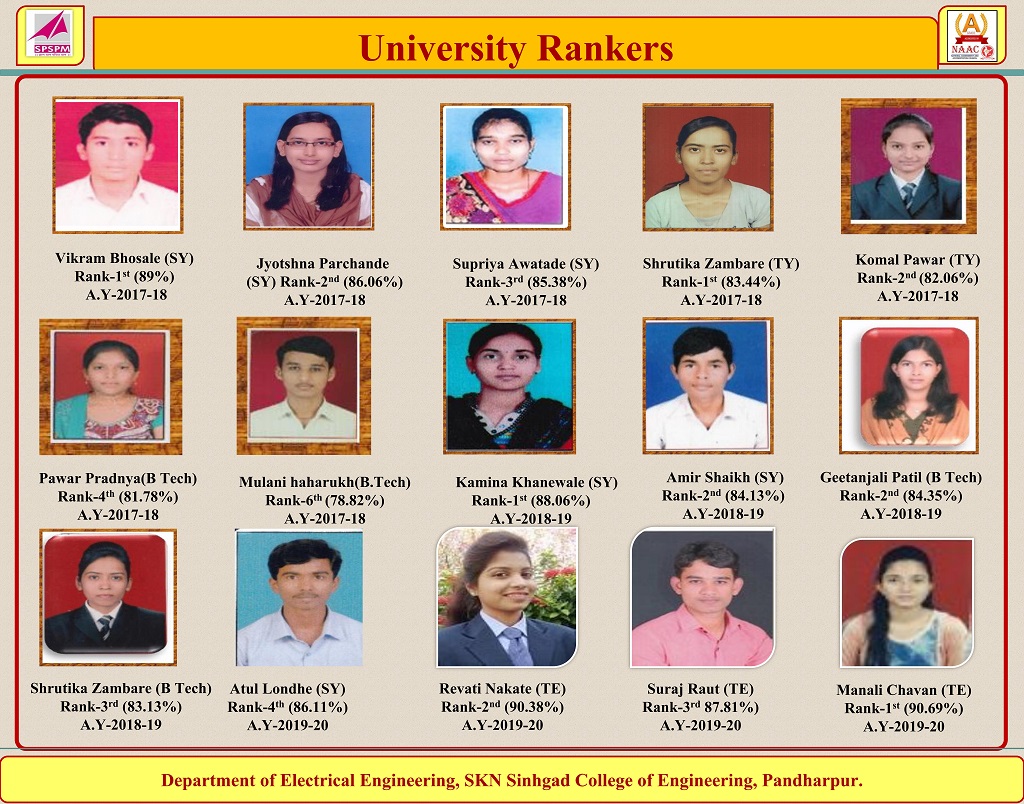
| Sr. No | Name of Faculty | Number of papers published in peer-reviewed journals/Conferences | Citation Index | h-Index | i10-Index |
|---|---|---|---|---|---|
| 1 | Prof.More V. P. | 3 | 15 | 1 | 1 |
| 2 | Prof.Chandane A.A. | 7 | 1 | 1 | 0 |
| 3 | Prof.Korake D. M. | 4 | 9 | 1 | 0 |
| 4 | Prof.God S. P. | 11 | 28 | 3 | 1 |
| 5 | Mr.Kondooru Shivashanker | 7 | 10 | 2 | 0 |
| 6 | Prof.Vyavhare P. B. | 5 | - | - | - |
| 7 | Prof.Masal A.R. | 3 | - | - | - |
| 8 | Prof.Ghodake S. D. | 5 | - | - | - |
| 9 | Prof.khandekar N. V. | 7 | - | - | - |
| 10 | Prof.Jadhav K. P. | 7 | - | - | - |
| 11 | Prof.Godase A. N. | 7 | - | - | - |
| Sr. No | Name of the author | Title of paper | Name of journal | Year of publication | ISSN number |
|---|---|---|---|---|---|
| 1 | Prof. Khandekar Nagnath Vyankati | “Smart Immersion Water Heater For Domestic, Commercial As Well As Industrial Use | GIS SCIENCE JOURNAL | 2023-24 | ISSN NO : 1869-9391 |
| 2 | Prof. Khandekar Nagnath Vyankati | Motor Protection From Theft By Using Artificial Intelligence And GSM Technology | IJARIIE | 2023-24 | ISSN(O)-2395-4396 |
| 3 | Prof. S. D. Ghodake | Power Factor Improvement Of 5hp Motor Using Arduino | IERJ | 2023-24 | ISSN 2395-1621 |
| 4 | Prof. S. D. Ghodake | A Survey On DTMF Based Irrigation Water Pump Control System | IERJ | 2023-24 | ISSN 2395-1621 |
| 5 | Prof. S. D. Ghodake | Implementation On Irrigation Water Pump Control System Based On DTMF Technology | IERJ | 2023-24 | ISSN 2395-1621 |
| 6 | Prof. S. D. Ghodake | Automatic Power Factor Enhancement System Utilizing Arduino | VLSI DesignTools & Technology | 2023-24 | ISSN: 2277-6184 |
| 7 | Kishor Pratap Jadhav | Smart Lightweight Solar Drone Technology | GIS SCIENCE JOURNAL | 2023-24 | ISSN NO : 1869-9391 |
| 8 | Prof. S. P. God | Design And Implementation On Industrial Automation With The Help Of Renewable Energy Sources | IJRASET | 2023-24 | ISSN: 2321-9653 |
| 9 | Prof. P.B. Vyavahare | Speed Control Of Induction Motor Using Plc And Vfd | IRJMETS | 2023-24 | e-ISSN: 2582-5208 |
| 10 | Prof. P.B. Vyavahare | Iot Based Soldier Health Monitoring & Tracking System With Panic Alarm | IJNRD | 2023-24 | Volume 9, Issue 5 May 2024| ISSN: 2456-4184 |
| 11 | Prof. P.B. Vyavahare | Battery Management System For Electric Vehicle Passive Cell Balancing On Lithium -Ion Polymer Battery | Journal of Research & Development | 2023-24 | ISSN: 2230-9578, April-2024, Volume-16 Issue-5 |
| 12 | Prof.A.N.Godase | Classification Of Power Quality Problems In Three Phase System Using Microcontroller | IJRCSIT | 2023-24 | ISSN:2319-5010 |
| 13 | Prof.A.N.Godase | Smart Hand Gloves Using Ardunio | IJRCSIT | 2023-24 | ISSN:2319-5010 |
| 14 | Prof.A.N.Godase | Analysis Of Power Quality Problems In Three Phase System Using Microcontroller | IERJ | 2023-24 | Volume 3 Issue 4 Page 7075-7079, 2024 ISSN 2395-1621 |
| 15 | Prof.A.N.Godase | Expressive Hands:Empathetic Communication For All | IJAAR | 2023-24 | ISSN – 2347-7075, Vol. 11 No. 5, DOI- 10.5281/zenodo.11526378 |
| 16 | Prof.A.N.Godase | Ardunio Based Infused Smart Gloves | Microcontroller Engineering & Applications | 2023-24 | 2024 | Volume :11 | Issue : 01 |
| 17 | Prof.D.M.Korake | Prepaid Energy Meter Kit | IJAAR | 2023-24 | ISSN – 2347-7075 Vol. 11 No. 4 DOI- 10.5281/zenodo.11178617 |
| 18 | Prof.D.M.Korake | Design And Development Of Solar Operated Pesticide Spraying Vehicle | IJAAR | 2023-24 | ISSN – 2347-7075 Vol. 11 No. 4 DOI- 10.5281/zenodo.11178617 |
| 19 | Prof. V. P. More | Mini Windmill Power Generation & Saving | A Multidisciplinary International Level Referred and Peer Reviewed Journal | 2023-24 | , ISSN: 2230-9578, April-2024, Volume-16 Issue-5 |
| 20 | Prof. Khandekar Nagnath Vyankati | Impact of Seasonal Variation on Corona Discharge and Overall Power Wheeling Efficiency of Overhead Transmission Line within Western Region | IJARIIE | 2022-23 | ISSN(O)-2395-4396 |
| 21 | Prof. Khandekar Nagnath Vyankati | Smart Monitoring Of Remotely Located Dustbin In Urban Area. | IJRCSIT | 2022-23 | ISSN No. 2319-5010 |
| 22 | Prof. S. D. Ghodake | Electrical Energy Audit Of Electrical Deparment | IJRCSIT | 2022-23 | ISSN No. 2319-5010 |
| 23 | Prof. P.B. Vyavahare | Power Generation By Using Speed Breakers | IJRCSIT | 2022-23 | ISSN No. 2319-5010 |
| 24 | Kishor Pratap Jadhav | Automatic Coil Winding Machine | IJRCSIT | 2022-23 | ISSN No. 2319-5010 |
| 25 | Mr A.R. Masal | IOT Based Greenhouse Monitoring And Controlling System | IJRCSIT | 2022-23 | ISSN No. 2319-5010 |
| 26 | Prof. A. A. Chandane | Emergency Vehicle System By Using Gsm Module | IJRCSIT | 2022-23 | ISSN No. 2319-5010 |
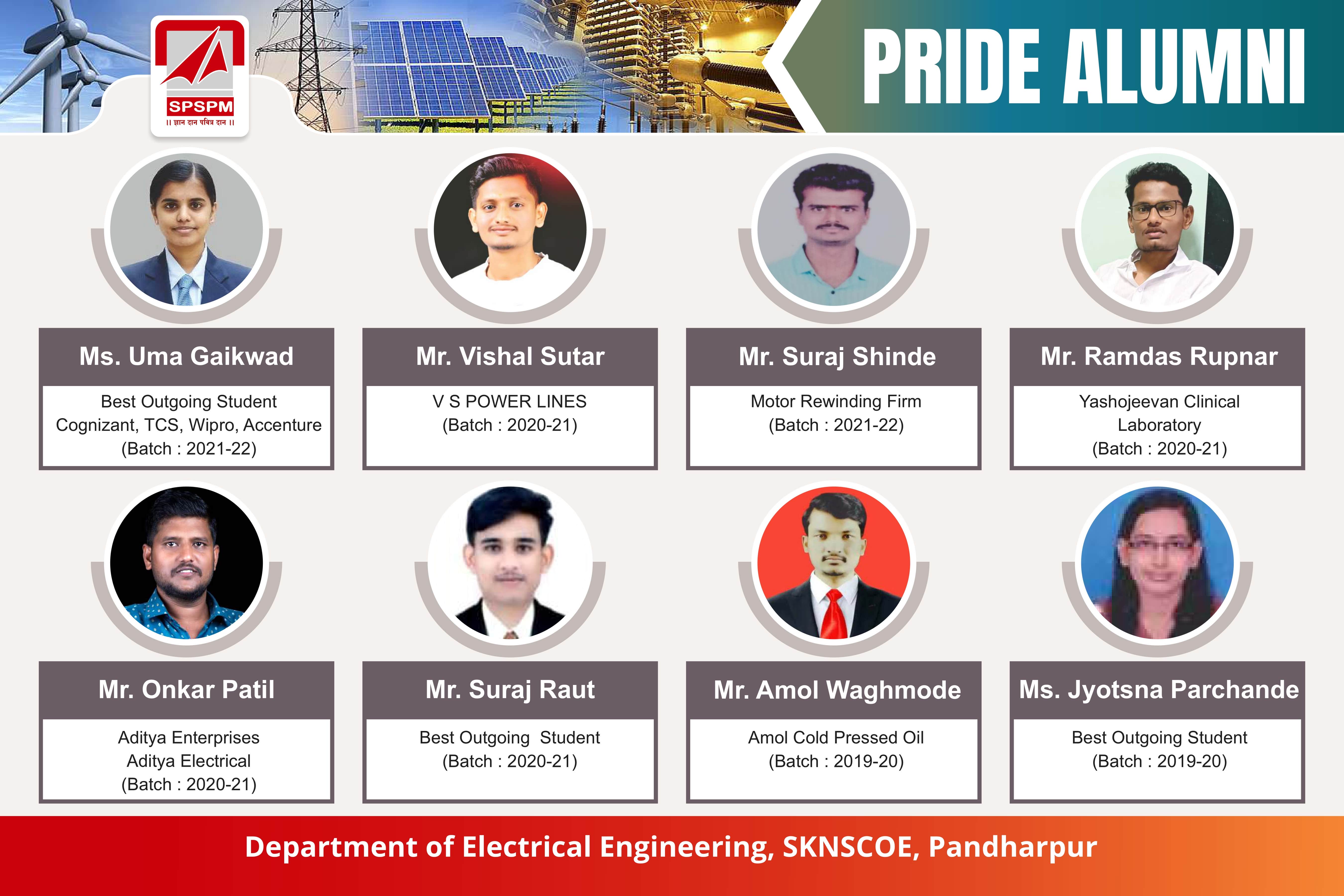
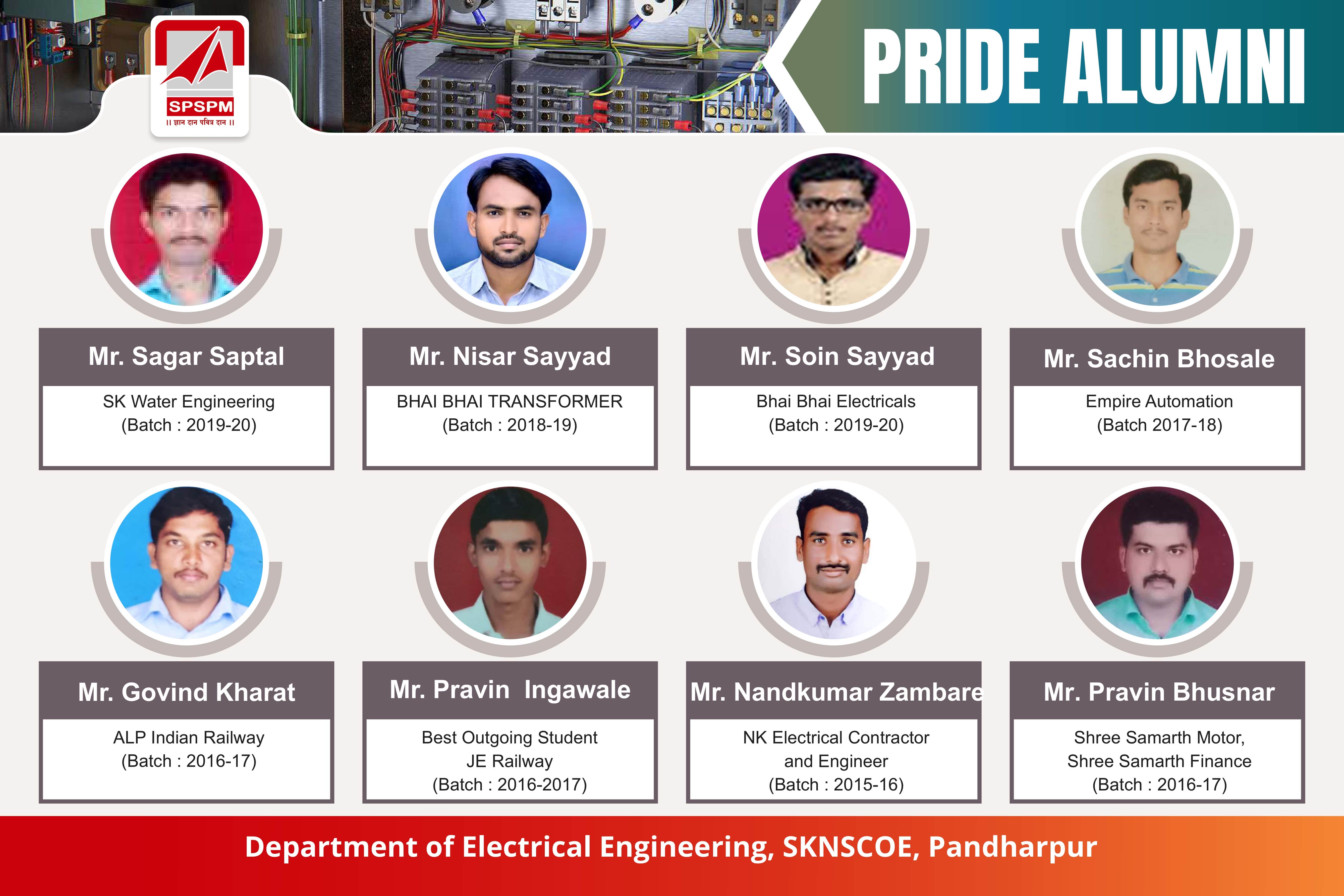
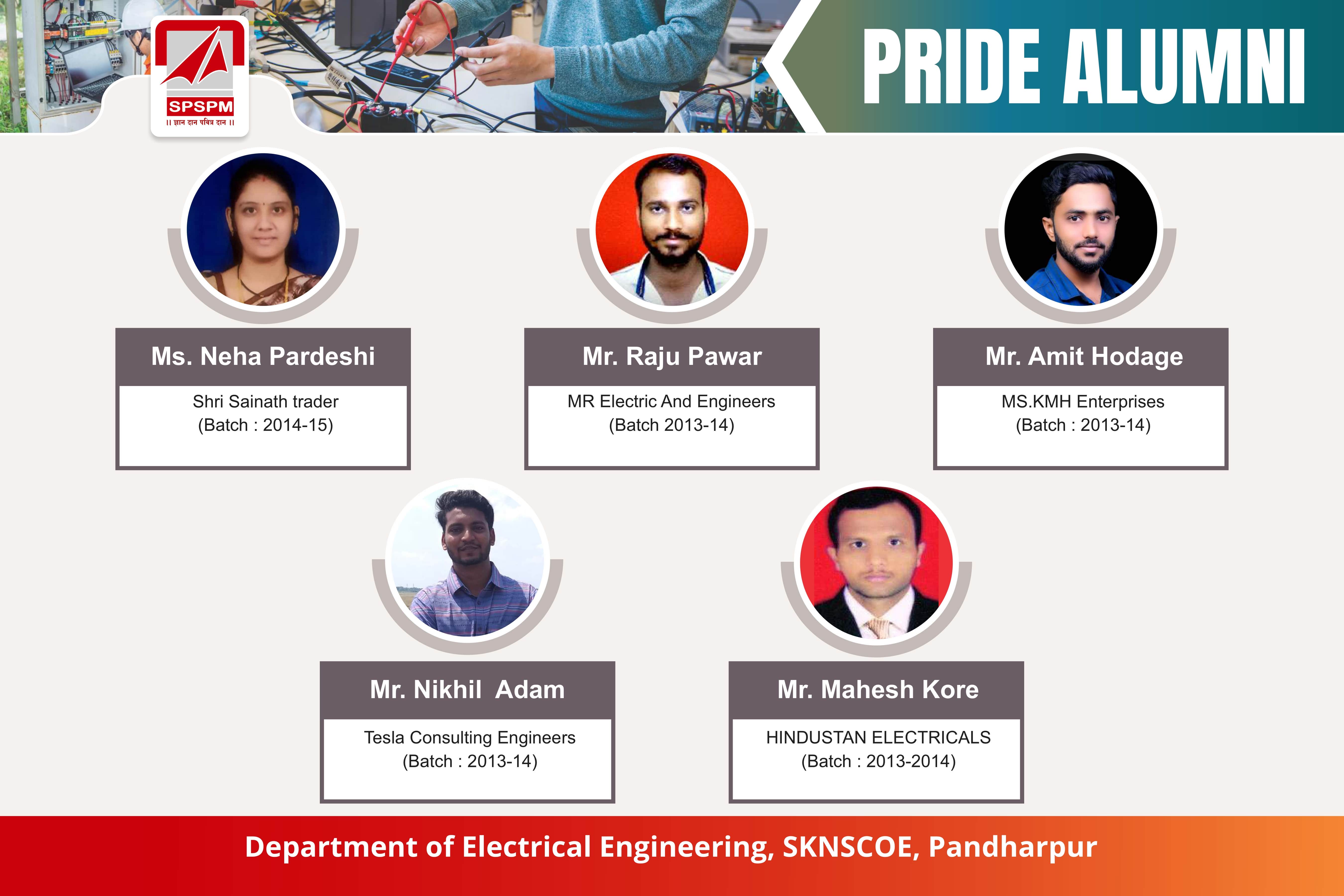
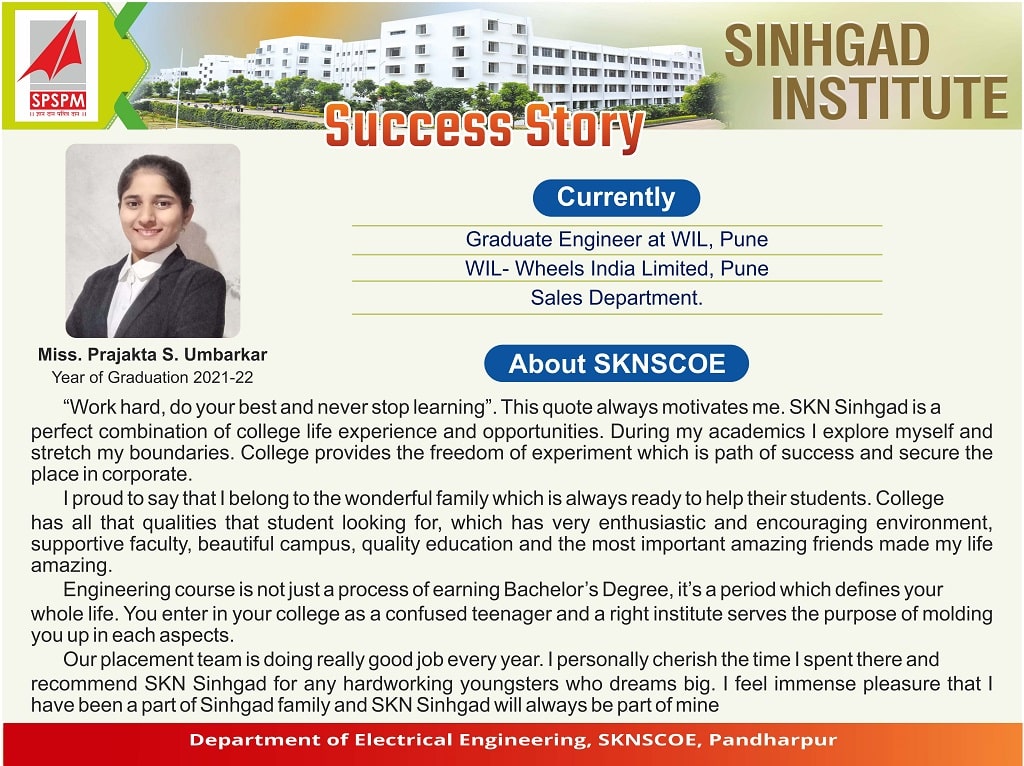
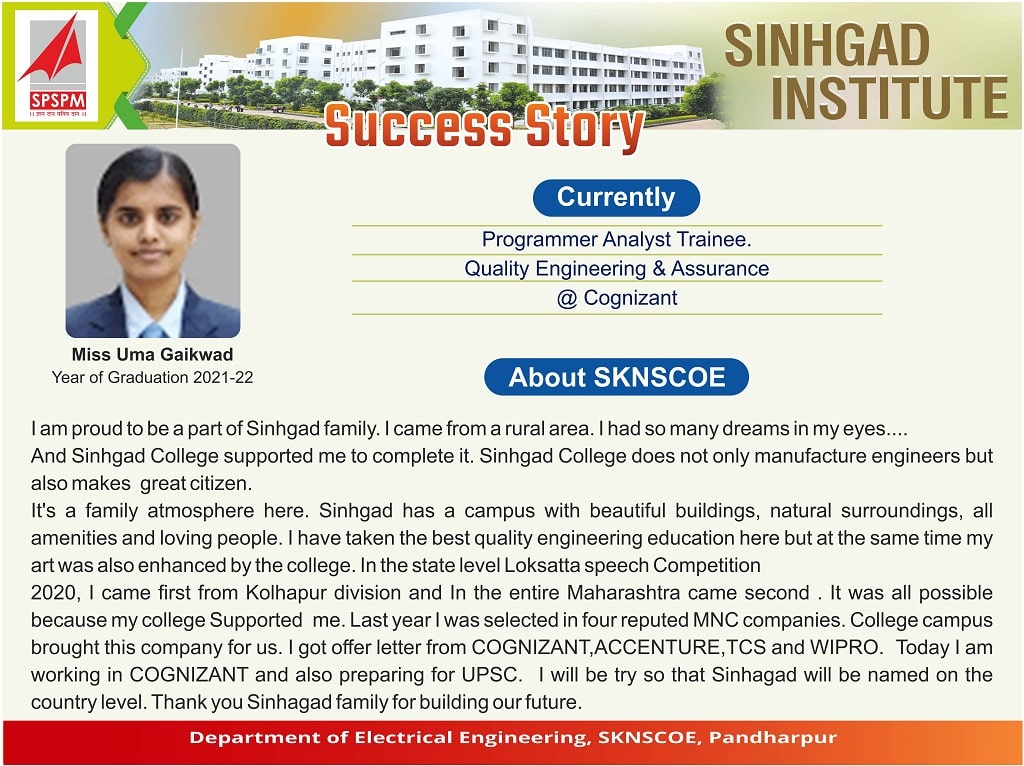
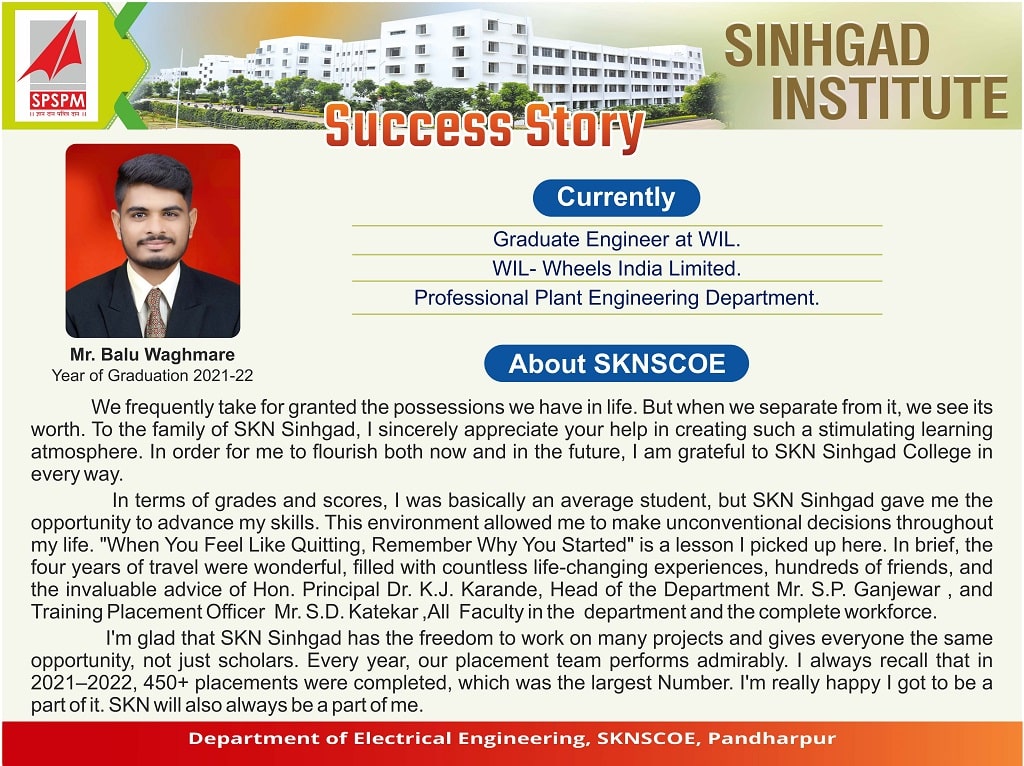
| Sr.No. | Name of organization | Purpose of MoU | Date of signing |
|---|---|---|---|
| 1 | Pantech E-Learning,Chennai | Online Webinar, Students Internship & Training, VAP, Workshops & research Collaboration. | 9/1/2024 |
| 2 | Tech Mantra Autodesk Authorized Training Centre Vijaypur, Karnataka | Providing adequate PCB Design using Autodesk Fusion software as training & placement assistance. | 2/1/2024 |
| 3 | Spartan Technologies | TIndustrial visits, Industrial training/internship, Guest lecture, workshop, consultancy work & Placements of Students. | 7/1/2023 |
| Sr.No | Name of Project | Name of Guide | Type | Year |
|---|---|---|---|---|
| 1 | The smart Energy Meter with prepaid | Mr.D.M. Korake | Product | 2023-24 |
| 2 | Smart hand gloves using Aurdino | Mr. A. N. Godase | Product | 2023-24 |
| 3 | Modern Load Shedding and time management system | Prof.D.M Korke | Product | 2022-23 |
| 4 | Wireless Electrical Vehicle Charging Station | Prof.V.P More | Product | 2022-23 |